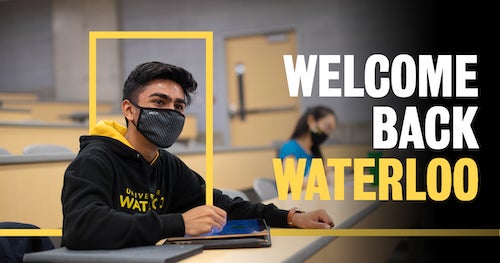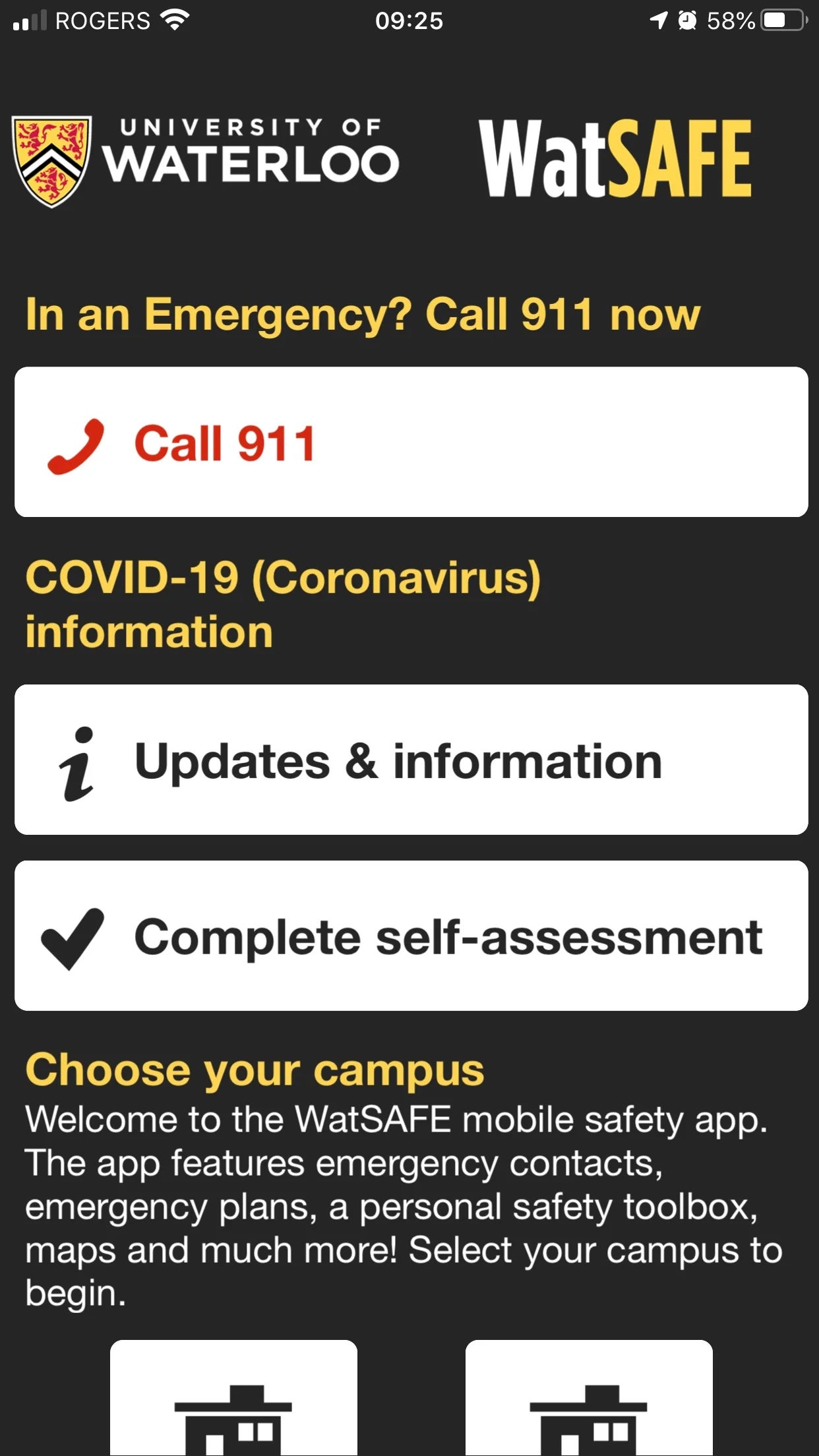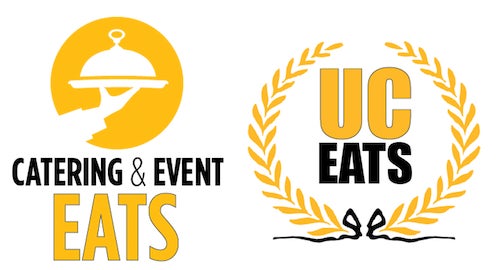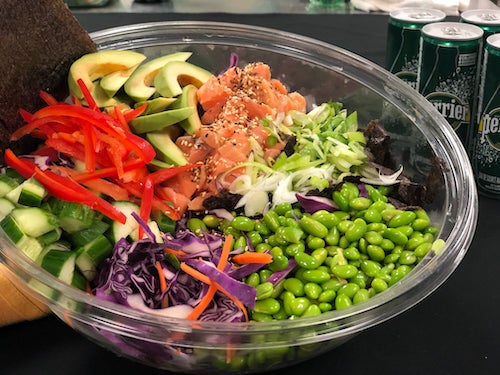Editor:
Brandon Sweet
University Communications
bulletin@uwaterloo.ca
Q and A with the experts: an update on what we know about the virus

The University of Waterloo has a number of experts available for comment on various aspects of the COVID-19 pandemic.
What we know about COVID-19 seems to change daily.
We asked Professor Narveen Jandu, an expert in microbiology, to give us an update on the science of the virus.
What is our current understanding of how the virus spreads?
The transmission of COVID-19 is predominantly spread through respiratory droplets from infected individuals and can be referred to as person-to-person transmission. This type of transmission is predominantly from direct contact with respiratory droplets from infected individuals during coughing, sneezing, talking, laughing or singing in close proximity others.
There are concerns about aerosol transmission, but in most situations, this type of transmission has taken place in crowded settings. Originally, there were concerns that fomite transmission (contracting the virus from inanimate objects contaminated with the virus) was a potential way in which the virus was spreading in the community, but it appears that most cases of infection are from exposure to the respiratory droplets of infected individuals.
What are the symptoms of COIVD-19 and what fraction of people who have it do not show symptoms?
Most individuals that are infected will experience generic symptoms that are mild or moderate. COVID-19 infection often appears as a fever, dry cough and/or body aches, pains, general malaise and tiredness, and in some cases, there is a loss of smell or taste. Individuals will experience varying combinations of these symptoms. The duration and severity will also vary from person-to-person, as this depends on the age of the individual, the underlying health of the individual and viral load (how much of the virus has entered an individual’s system). Most cases of infection (80 percent) will be mildly symptomatic or asymptomatic. The remaining 15 percent of cases will experience severe symptomology, and 5 percent will become critical.
What is the damage that can be caused to the body by the virus?
In the small percentage of cases in which symptoms are more robust, severe and/or critical, viral replication and physiological damage can go beyond the respiratory tract. Typically, and in the majority of cases, coronavirus replicates in the respiratory tract, which results in the most common symptoms (outlined above). Within the respiratory tract, some individuals may develop pneumonia. In the most severe cases of infection, the virus can cause pathology in other body systems, most notably the cardiovascular system, kidneys and/or the gastrointestinal system.
Narveen Jandu is an associate professor in the School of Public Health and Health Systems. Her research interests include studying the molecular mechanisms of pathogenesis of communicable bacterial infectious diseases.
Protect yourself and others with masks, hygiene etiquette while on campus

With fall term resuming this week, remember that a face covering is required in common use areas of University buildings. This includes corridors, lobbies, washrooms, elevators, classrooms, teaching laboratories and meeting rooms, or in any area where physical distancing is a challenge.
A face covering can be a medical or non-medical mask or other covering that covers the nose, mouth and chin. You can bring your own mask to campus or purchase a cloth mask at the W Store. Additional protective equipment may be needed in specific lab or work settings. Find the latest guidelines for researchers and employees.
Researchers, managers and supervisors are reminded that if you are or have employees who are currently working on campus, you should place an order for face masks immediately. You can order cloth face masks from Central Stores. Learn more about ordering face masks.
Learn more about face coverings on campus.
If you are working from home, please continue to do so until you receive further direction from your manager or supervisor. Students and employees who are visiting campus should consider the following:
WatSAFE and Campus Check-In

WatSAFE is the University's official emergency notification tool, providing quick and convenient access to campus safety and emergency resources.
Download the WatSAFE app to stay connected and informed. A COVID-19 self-assessment feature has been added to the app.
If you have not recently opened the app you may need to accept an update before seeing the self-assessment button.
Effective Tuesday, September 8, if you need to be on campus, you must record every visit to campus buildings using Campus Check-In. There's no app to download or install, and you can choose to log your attendance in campus buildings by connecting your mobile device or laptop to the eduroam network, or by logging key details about your campus visit using the online Campus Check-In form.
Hand hygiene
Wash your hands frequently with soap and running water. When soap and running water are not available, an alcohol-based hand sanitizer is a good alternative. Learn more about proper hand hygiene.
Respiratory etiquette
Cover your mouth and nose with a tissue when you sneeze and immediately discard the tissue. If a tissue is not available, cough or sneeze into your elbow, not your hands. Wash or sanitize your hands immediately. Learn more about proper respiratory etiquette.
Physical distancing
When on campus, practice physical distancing by keeping a distance of 2 metres away from others. Wear a face covering in common indoor spaces. The University has installed signs around campus to remind you how to maintain a safe physical distance. Staircases and corridors now feature arrows to direct traffic, and signs indicate the maximum number of people who can be in elevators and washrooms at the same time.
Food Services launches delivery services through its mobile ordering app

A message from UW Food Services.
Move aside, UberEats – there’s a new delivery service on campus. UW Food Services is proud to launch two new dining concepts on their app (UW Food Services) that offer delivery and pick up. Featuring delectable dishes like Poke Bowls, rice bowls, burgers, sandwiches, salads and more, it’s a wide range of offerings that will keep everyone satisfied.

A family-sized Poke Bowl.
Meals in the Catering Eats app are offered in single portions or 4 portions – enough for the family or lots of leftovers. UC Eats provides lunchtime options for one, and dinner meal boxes that can be taken home for those nights that you just don’t have time to plan.
The best part? UW Food Services isn’t going to get you with those hidden costs – there is no delivery charge, no service fee and no tipping.
The UW Food Services app is available on the App Store and Google Play. It accepts (student) Watcard and credit card. If you try it, UW Food Services invites feedback so we can cater to you.
Link of the day
70 years ago: the laugh track chuckles its way into TV history
When and Where to get support
Students can visit the Student Success Office online for supports including academic development, international student resources, leadership development, exchange and study abroad, and opportunities to get involved.
Instructors can visit the Keep Learning website to get support on adapting their teaching and learning plans for an online environment. The following workshops are current offerings from the KL team (CTE, CEL, ITMS, LIB):
Getting Ready to Facilitate Online Courses: TA Training, beginning July 13.
Remote Course Design Essentials, beginning August 26.
Independent Remote Course Design Essentials. Continuous self-enroll course in LEARN.
LEARN for TAs, Tuesday, September 15, 10:00 a.m.
LEARN for TAs, Wednesday, September 16, 2:00 p.m.
Employees can access resources to help them work remotely, including managing University records and privacy of personal information
Interested in learning more about engaging your students in an online course? The Centre for Extended Learning has created a new resource for you called "Fostering Engagement: Facilitating Online Courses in Higher Education"
ThisOpen Educational Resource was designed for post-secondary instructors and teaching assistants who would like to better understand the critical role of facilitation in online course delivery, and build practical skills and strategies that are relevant, effective, and authentic.
Here are some tips for staying healthy while working from home.
The Writing and Communication Centre is rolling out virtual services and programs for fall term:
- Undergrad students -- work with us to brainstorm, draft, revise, and polish assignments by meeting with our writing advisors in virtual appointments. Chat with our friendly and knowledgeable peer tutors in our virtual drop-ins and PJ-friendly writing groups. Or experience an online workshop at your own pace.
- First-year Warriors! Check out Waterloo Ready to Write to build your skills for writing success.
- Graduate Students -- meet with an advisor in a virtual appointments, take an online workshop, join the grad writing community at our Virtual Writing Cafés and #WaterlooWrites groups, develop your academic voice at Speak Like a Scholar, or make progress on your thesis at Dissertation Boot Camp.
- Instructors and faculty -- Request and access WCC workshops for use in your courses, join a virtual writing group, or speak with a writing advisor about a writing project.
We understand that these circumstances can be troubling, and you may need to speak with someone for emotional support. Good2Talk is a post-secondary student helpline based in Ontario, Canada that is available to all students. If you feel overwhelmed or anxious and need to talk to somebody, please contact the University’s Campus Wellness services, either Health Services or Counselling Services. You can also contact the University's Centre for Mental Health Research and Treatment.
The Library has published a resource guide on how to avoid information overload.
The Faculty Association of the University of Waterloo (FAUW) continues to advocate for its members. Check out the FAUW blog for more information.
The University of Waterloo Staff Association (UWSA) continues to advocate for its members. Check out the UWSA blog for more information.
WUSA supports for students:
Food Support Service food hampers are currently available from the Turnkey Desk on weekdays from 9:00 a.m. to 4:00 p.m. in the Student Life Centre. If you have any questions please email us at foodsupport@wusa.ca.
The Bike Centre – Now open by appointment for your bicycle repair and rental needs in the Student Life Centre. For more information or to schedule an appointment, please go to: https://wusa.ca/bikecentre
Centre for Academic Policy Support - CAPS is here to assist Waterloo undergraduates throughout their experience in navigating academic policy in the instances of filing petitions, grievances and appeals. Please contact them at caps@wusa.ca. More information at http://wusa.ca/caps
WUSA Commissioners who can help in a variety of areas that students may be experiencing during this time:
- Equity – equity@wusa.ca
- Co-op and Experiential Affairs – coop.affairs@wusa.ca
WUSA Student Legal Protection Program- Seeking legal counsel can be intimidating, especially if it’s your first time facing a legal issue. The legal assistance helpline provides quick access to legal advice in any area of law, including criminal. Just call 1-833-202-4571.
Empower Me is a confidential mental health and wellness service that connects students with qualified counsellors 24/7. They can be reached at 1-833-628-5589.
When and Where (but mostly when)
Healthy Warriors at Home. Free programming including Online Fitness, Personal Training, Health Webinars, Personalized Nutrition and more. Open to students, staff, faculty and alumni. Register today.
Warriors Basketball Web Workouts. Register today to gain access to online content that is guaranteed to help you improve your basketball skills; regardless of your current skill level. Open to all ages. New content added weekly throughout the year for only $100. Register today.
Part-time Master of Business, Entrepreneurship and Technology (MBET) Information Session.Make an entrepreneurial impact where you are today as you complete your graduate degree. Registration for the part time program is still open for Fall 2020.Wednesday, September 9, 5:30 p.m. to 6:30 p.m., Learn more.
WUSA Welcome Week,Monday, September 14 to Friday, September 18.
Portage-Global Water Futures Research Data Management webinar series: “(Some) Research Data Management Best Practices!” Wednesday, September 16, 1:00 p.m. Registration details can be found here.
More Feet on the Ground Mental Health Training for Faculty and Staff, Tuesday, September 22, 9:30 a.m., Online – Register on GoSignMeUp.
Positions available
On this week's list from the human resources department, viewable on the UWaterloo Talent Acquisition System (iCIMS):
Regular full-time positions
- Job ID# 2020-5643 - Administrative Coordinator and Advisor, Undergraduate Studies – Economics, USG 6
- Job ID# 2020-5633 - Advancement Manager - School of Architecture, USG 9 – 10
- Job ID# 2020-5673 - Client Services Support Coordinator - Plant Operations, USG 5
- Job ID# 2020-5702 – Groundsperson - Plant Operations, CUPE
Internal secondment opportunities
- Job ID# 2020-5695 - Custodian I - Plant Operations, CUPE